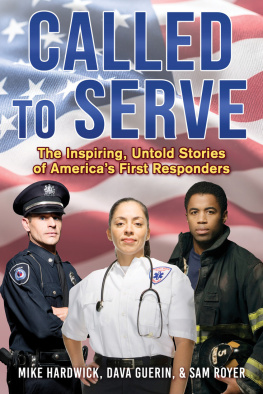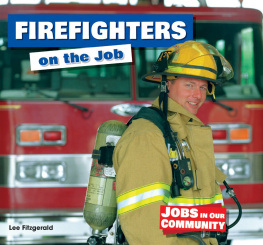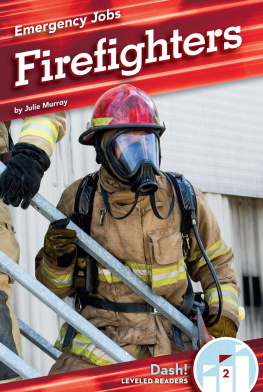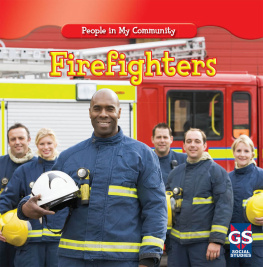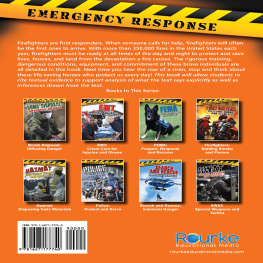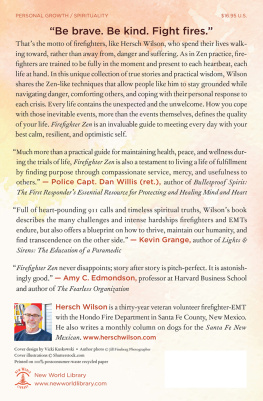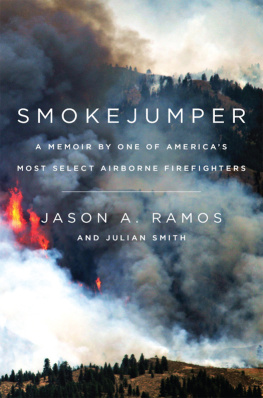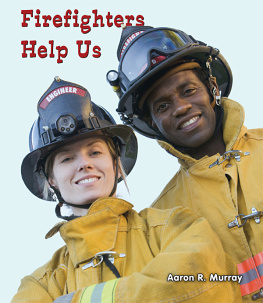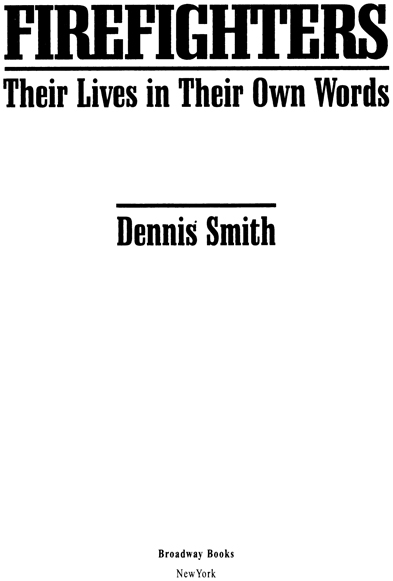Id like to thank Jane OConnor for her coordination, Mimi Bright for her attention, and Harvey Eisner for his connections with fire departments all over the country.
Preface
S OMEONE HAS TO DEAL WITH FIRE. W HEN PEOPLE FIRST BANDED together in small societies, they realized that if fire were not dealt with, it would consume everything in its path.
In our highly developed, technological society, the same confrontation with fire exists, as it has for thousands of years. When a fire occurs, someone has to deal with it. Here in America, those men and women whose responsibility it is to deal with fire are those seemingly easygoing folks down at the local firehouse. When the alarm comes in at three in the morning on a cold winter night for a fire rushing through a tenement building in a poor section of a large city or at one in the afternoon for a young child who has fallen into an abandoned water well or at seven in the evening for a barn fire that is miles away from any kind of water supply there is this particular group of people who put on their rubber boots and their specially treated fire coats and their fire helmets to respond to the call of others in need of help.
They may ride the engine, which is the squat vehicle with all the hose in it, or they may ride the truck, which is the long hook and ladder or the one with the aerial ladder. The truck firefighters responsibility is to rescue trapped victims, to force entry, and to ventilate so that the heat and smoke have a way to escape the building. Or they may belong to the rescue squad, whose responsibility is to deal with all the special emergencies, such as building collapses, hazardous material situations, explosions, extrications from vehicles, trains, or planes, landslides, snowslides, and cave-ins.
It doesnt matter what group the firefighter is attached to. It matters only that he or she is out there in all weather and emergency conditions to give service to fellow human beings. Somebody has to do the job, and in the following pages you will read about the lives of these men and women, both paid and volunteer, who protect us from the ravages of fire and other emergencies, or die trying.
The firefighters in these pages are at once very special and not so special. They are very special because they represent a group of people who are different from other professional and working-class people. They represent a group of people who die in the line of duty more often, proportionately, than those in any other occupation, including police, construction workers, and miners. They are people who understand the dangers surrounding them, yet respond to each new alarm with newfound enthusiasm for the action ahead. These men and women like what they do, and they like themselves because of what they do. They are pleased that they have been given the opportunity and the calling to help others in a way that is at once meaningful and exciting. Like other Americans, they care about their homes, their families, their churches and organizations, yet they are the ones who answer the alarm at three in the morning, not knowing what awaits them. They are trained to meet any emergency, perhaps to give a fast wink to death and a pat on the butt to danger.
At the same time, they are very ordinary and not at all special, for they are just some of the one and a half million firefighters in all fifty states. About two hundred thousand of them are paid firefighters working in our metropolitan areas, military installations, large factories, and airports. The rest are volunteers serving their communities for no compensation and no pension, in that wonderful and important American tradition of voluntarism. Where would the country be without these volunteers? it might be asked. The question is only rhetorical, for the volunteers will always be with us, serving proudly just as they have since men got together to fight the first recorded American fire in the provision warehouse of Jamestown, Virginia, in 1609, and since Benjamin Franklin organized the first volunteer fire company in Philadelphia in 1735.
It takes a dedicated, committed, and courageous person to enter the blind, boiling darkness of a building on fire, to crawl through poisonous smoke, to confront the threat of the flames. These are the kind of people I met and talked with in the course of creating this book. Yet not one firefighter would refer to himself as any of these things but simply as a person trying to do his best in tough situations.
I have been reminded often in these interviews of how natural and graceful real humility can be, and how well humility fits within the true heart. I felt I was a small reporter being honored by people who are as close as we can get to royalty in America. I have been moved to tears, I have felt the blood pushing hard through my veins, I have felt empathy and deep admiration for these men and women who have done significant things in their lifetimes. I cherish my moments with these firefighting citizens.
To create a book is mans work, but to put ones life on the line to protect the life of another human being is the work of God. Although I have written many books and fought many more fires, I have never felt so accomplished as I feel in bringing the stories of these American firefighters to you.
Dennis Smith
New York City, 1988
Introduction
T HE ECONOMIC BENEFITS OF BEING A FIREFIGHTER ARE NOT REALLY great. The time off is fairly decent. Work schedules vary widely from place to place, but generally speaking firefighters have more time off in a consecutive way than most people. At the same time, many of them work forty-eight and fifty-two hours a week. New York firefighters work forty. Volunteer firefighters dont enjoy this same benefit, but they do share in the greater benefit of working with great guys. When you go to work, you know you are going to sit in the firehouse kitchen with people who are interesting, funny, and worthy of your attention.
Another benefit of being a firefighter is your sense of self-worth. You go out on a job, you eat some smoke, you take a little heat, and you get the great satisfaction of confronting the flames and defeating them. You know youre doing a good job, and thats a very valuable benefit.
Theres not much money for the paid firefighters. Only the bosses get paid well. The fire commissioner of New York gets paid more than most big-city mayors. But the ordinary firefighter is almost always paid less than a schoolteacher, generally on a parity with policemenand he works more hours.
Paid vacation time is good, generally three or four weeks after four or five years. The trouble is, your time off is seldom in sync with the rest of the world. When your kids are starring in the school play, youre working. If theres a rare family reunion at Thanksgiving, youre working. And when you should be celebrating the babys first Christmas, youre working. Thats a minus. And, thats the breaks.


